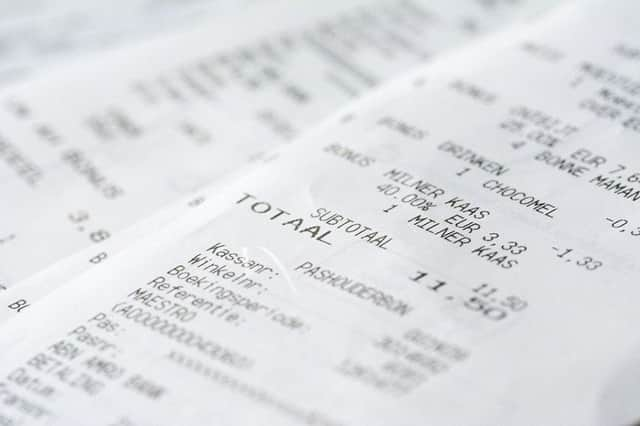Campaigners call for ban on printed receipts as one billion end up binned


The move would benefit both public health and the planet, they say.
More than 11 billion receipts are dished out each year across the UK, including one billion north of the Border.
Advertisement
Hide AdAdvertisement
Hide AdMost end up chucked away with barely a second glance – nearly 10 billion, which is equivalent to 53,000 trees going straight in the bin.
By weight, the country generates about 7.5 million kg of waste each year from receipts.
Although the little slips of paper are more degradable than materials such as plastic, the majority cannot be recycled because they’re coated with chemicals and contaminate other paper.
Compounds used in printers for tills, credit card machines and cashpoints have also been identified as hormone-disruptors, linked to fertility problems and diseases such as breast cancer.
And then there’s the environmental impact – millions of barrels of oil and water are used to produce the paper.
Some retailers now offer customers the option to refuse a paper receipt or to receive an electronic version, but campaigners insist more could be done to eliminate this unnecessary waste.
Dr Richard Dixon, director of Friends of the Earth Scotland, believes new legislation that outlaws automatic receipts would result in an immediate and drastic reduction in the amount created.
Writing in The Scotsman today, Dr Dixon said: “There used to be security reasons to have a receipt but nowadays smart scanners, automated tills and card payments mean most shops know more about our buying habits than we do ourselves.
Advertisement
Hide AdAdvertisement
Hide Ad“Some shops now email you a receipt rather than give you anything on paper. Some shops already ask if you want a receipt before printing one and there is no reason that this could not become the legal requirement, slashing the number of receipts overnight.
“Till receipts do not make up a huge volume of our waste but, like plastic shopping bags, they are symbolic of our wasteful habits, because they are something we come across every day.”
He is calling for the Scottish Government’s Expert Panel, set up to encourage sustainable consumer and producer behaviour, to consider a ban.
Environment secretary Roseanna Cunningham said: “Reducing waste and encouraging people to recycle is key in our development towards a more circular economy.
“We are aware that many retailers have rolled out digital receipts systems in recent years. This is indicative of a move away from paper receipts within the retail sector – with more and more businesses asking customers if they want paper receipts or offering the option of a digital receipt – which is very positive, and we hope these systems will be more widely used in the future.
“The Expert Panel, formed to look at issues around single-use items, is focused on identifying measures to tackle plastic pollution. They are currently considering items which are challenging to recycle, such as single-use disposable beverage cups, as a priority.”
A bill banning printed receipts except by request has cleared its first hurdle in the state legislature of California .